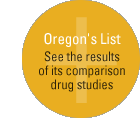|


In the vanguard of the consumer movement to rein in the rising costs of prescription drugs are the citizens of Maine. Since the late 1990s, Maine's seniors have been piling onto buses headed for Canada where they fill their drug prescriptions at a fraction of the price they would pay in the U.S. The plight of these seniors led Maine's legislature to pass the pioneering and controversial "Maine Rx" bill in March 2000, which would allow the state to bargain for cheaper drugs, just as authorities do in Canada.
In effect, Maine could now use the buying power of its Medicaid program -- which purchases nearly 25 percent of all drugs sold in the state -- as a bargaining chip to convince drug companies to give rebates on prescriptions to citizens who are not eligible for Medicaid.
If a drug manufacturer does not provide a discount, that manufacturer's products may be placed on a list of drugs that require preauthorization for payment. Preauthorization results in shifting market share to other drugs and generic equivalents, making it a powerful tool for negotiating prices.
The drug industry regards Maine Rx as a dangerous step towards government price control. Marjorie Powell, a spokeswoman for the industry's trade group, Pharmaceutical Research and Manufacturers of America (PhRMA), tells FRONTLINE, "It's not negotiation," she says, "It's government regulation, government establishment of the price for a particular product."
Shortly after Marine Rx passed, PhRMA won an injunction barring the state from putting Maine Rx into effect. PhRMA argued that the prior authorization requirement could curtail Medicaid recipients' access to drugs. A year later, an appeals court reversed the decision in favor of the state but agreed to keep the legislation on hold until the U.S. Supreme Court heard PhRMA's appeal.
In May 2003, in a surprising 6-to-3 decision, the U.S. Supreme Court ruled against PhRMA and lifted the injunction against Maine Rx. However, the decision was not an unqualified endorsement of the program. "By no means will our answer … finally determine the validity of Maine's Rx program," wrote Justice Stevens for the court. That determination will likely be made by a lower court or the U.S. Secretary of Health and Human Services, who will weigh evidence of the program's impact on consumers.
A revised version of the program, called Maine Rx Plus and designed to address the legal challenges raised in the PhRMA lawsuit, is scheduled to go into effect in January, 2004. The new program will provide discounts
of 15 percent to 60 percent on prescriptions for individuals with income at or below $31,458 and couples with income not exceeding $42,420. Individuals whose drug expenses amount to more than 5 percent of their income will also be eligible.
The Supreme Court's qualified approval of the program has led other states to develop programs similar to Maine's. Around 18 other states have legislation moving forward: Hawaii, Colorado, Florida, Georgia, Illinois, Indiana, Massachusetts, Michigan, Minnesota, Mississippi, Missouri, New Jersey, New York, Ohio, Rhode Island, Tennessee, Texas, Vermont, and West Virginia. A dozen other states have filed bills proposing other types of discount programs.
In addition, a number of cities and states are pursuing legislation designed to lower the cost of prescription drugs for government employees. In Springfield, Mass., the mayor has launched the first formal program to import drugs from Canada for 1,100 city employees. Both Illinois and Iowa have indicated their intentions to seek lower-priced medicines from Canada for state employees and state retirees. And although no plan is yet in effect, New York Mayor Michael Bloomberg is pressuring federal legislators to enact laws to legalize the practice of importing drugs from Canada.
| |


Oregon realized that along with senior citizens on Medicare, there was another group -- the uninsured poor -- who were affected by the skyrocketing drug prices that were eating up the state's Medicaid budget.
The crisis became then Governor John Kitzhaber's top priority. He believed the state's health care system needed to build its own approach -- tackling rising costs for medicines not by controlling prices but by spending its health dollars more efficiently.
A former emergency room physician, Kitzhaber recognized that the system was riddled with wasteful drug prescriptions. One example: doctors who prescribed the expensive anti-inflammatory drug Celebrex for injuries that often could have been treated relatively inexpensively with over-the-counter ibuprofen.
To fix the problem, he wanted consumers and doctors to have access to unbiased, evidence-based information about a drug's efficacy. "Imagine how difficult it would be for you as a consumer to buy a toaster or a car or an appliance without Consumer Reports, that gives you objective information to compare those products," he says. "That doesn't exist in the drug market today."
Kitzhaber's effort led to Oregon's legislature passing a drug bill in July 2001 that included his idea of a Consumer Reports-style preferred drug list, (sometimes called a formulary). The state then hired researchers from the Oregon Health & Science University to compare drugs within the same class in head-to-head studies for safety and efficacy. If a blockbuster drug did not survive the scrutiny of Oregon's Health Resources Commission (HRC), the state's scientific watchdogs, it would not appear on the state's preferred drug list.
By August 2002, it was clear that many blockbuster drugs -- including Prilosec, Nexium, Vioxx, and Celebrex -- had failed to make Oregon's list. Drug companies argued that the state was depriving Medicaid patients from access to the newest medications, and that physicians, not the state, should have the ultimate say.
"In general, I think the more information physicians have about the benefits of drugs and their costs, the better they are going to be," says Sidney Taurel, the CEO of the pharmaceutical giant Eli Lilly. "Where I object is when this results in saying drug A is the only one that you can prescribe to all your patients."
"We designed this bill to make sure that we didn't substitute regulations or rules for clinical judgment," Kitzhaber responds. Under Oregon's program a physician can prescribe a drug not on the state's preferred drug list, write "do not substitute" across the prescription, and the state will pay for the drug.
Oregon's approach appears to be catching on. According to a June 2003 article in The New York Times, 22 states have adopted some type of a preferred drug list for Medicaid patients. In the first two months after its drug bill was implemented, Oregon reported a 30 percent shift towards the use of drugs on its preferred lists. And the pharmaceutical lobby's lawsuits to block preferred drug lists in Michigan and Florida have been rejected by the courts in both states.
| |